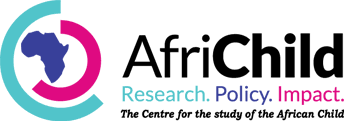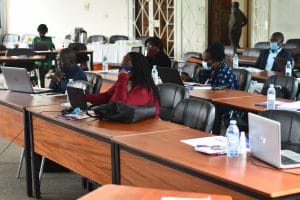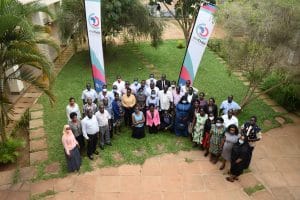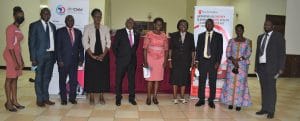On May 17 2019, AfriChild successfully disseminated findings from six of its studies at a national conference it organized held at Golf Course Hotel –Kampala. Themed: ‘Putting Ugandan Children at the Heart of Sustainable Development: What is the Evidence?’, this conference brought together academics, members of civil society organizations and government officials to share scientific evidence in order to strengthen policy and programming for children. Emphasis was placed on the fact that children make up more than half of the total population of Uganda therefore they are key stakeholders in the future of the country. It is thus imperative that planning for them puts into serious consideration their voices.

This conference marked the end of the first phase of the inter-university mentorship programme that span over two years. Mid-level researchers who comprised of teaching staff of seven universities were trained in child focused research methods during the programme. Participating universities were: Makerere; Kyambogo; Muni; Uganda Christian University(UCU); Uganda Martyrs University (UMU), Gulu and Nsamizi Institute of Social Development. After the second training held in June 2018, AfriChild awarded all the universities with seed grants each to undertake research in children’s issues. The research findings were disseminated at this conference.
PANEL DISCUSSION

A panel discussion comprising of policy makers, practitioners and academia was formed to discuss child focused research and its implications for their different sectors. According to Sydney Sproul from the Uganda National Academy of Science, it is difficult to know what the research agenda is in Uganda. For instance, research on child labor often produces statistics that are alarming. However, on closer scrutiny, one may realize that those families are severely impoverished.
This points to a need to try and find consensus on what can be deduced from the work of different experts i.e. the translation of research findings to deduce what the truth of the matter is about a particular phenomenon. Scientists too, need guidance,”
Sydney Sproul – UNAS
On the role of academia in child focused research, it was noted that a lot is happening in Uganda regarding children and so many problems exist that require solutions. The onus lies on the academia to investigate and use the evidence generated to propose solutions to the problems children are facing.
On the critical challenges in doing research with children themselves, Fredrick Mukhwana, a researcher from UCU told participants that many a time, adults want to impose their world on children yet children have their space.
“The world today is different from the world back then, social support systems have completely changed, children understand their world best and we need to listen to them to help us understand their world so that we come up with appropriate solutions. It is therefore important to do research with children because they understand their situation better,” he said.
Regarding data, policy makers have for long looked for accurate data in vain, especially data on children. Different organizations and individuals came up with research that was not rigorous and would give their own interpretations. This created a need to research that informs policies. A clear example is the current efforts to draft the national child policy being informed by results of the National Violence against Children Survey which was conducted by AfriChild with the support of UNICEF, CDC and other partners.
For government to come up with solutions, they have got to utilize research from academic institutions because they follow rigorous methods and follow methodologies that produce that produce quality and representative results. Regarding the low uptake of research findings by some policy makers and how this can be addressed, the consensus was on generating interesting, by providing relevant and well packaged information that can be utilized meaningfully to inform policy.
One of the challenges that policy makers face in their appreciation of research has to do with the fact that sometimes policies are determined by politics and not necessarily evidence. This in part explains why many policy makers do not consume and utilize research.
DISSEMINATION OF RESEARCH FINDINGS

In the afternoon, the conference broke out into two parallel sessions covering parenting and rights respectively. In these sessions, researchers shared findings from the various researches that were undertaken.
Impact of Parenting Styles on Adolescent Development in Amuru District, Northern Uganda
This study was conducted by researchers from Gulu University. Adolescents in Amuru continue experiencing aftershock effects from continuously migrating from their homes due to the war that affected the northern part of Uganda for years. Amuru was purposively selected because it hosted the biggest Internally Displaced People (IDP) camp during the war. The study concluded that there are variations in adolescent outcomes for the children living in post conflict environment as much as there are variations in parenting styles for the children living in post conflict environment. Parenting and adolescent development variations exist among individuals.
Views of Children on Parental Role in Promoting Primary School Retention in Busoga Region Uganda

This study was conducted by researchers from Kyambogo University. Busoga region was selected because it has consistently shown low retention rates according to data from previous studies. Little is known about the perspectives of children on what parents should do to ensure they stay in school. Data was collected data from nine schools in Namayingo, Iganga and Buyende districts and children were asked to tell their story about how their parents help them to keep at school. Key findings include: There was high parental encouragement (92%), were able to check child book (89%) and help with homework (62%); Children identified what parents should do to motivate them to stay at school as: buying new cloth, scholastic materials, care, paying tuition, visiting at school, pocket money and feeding them and when needs of girls are not met, they can be abused, misdirected and have higher chances of drop out.
Understanding Parenting: Perspectives of Parents and Children in Uganda
This study was conducted by the AfriChild Centre. The study was undertaken in three districts of Uganda; Kampala, Lira and Ibanda. One hundred eighty 180 adult caregivers and 180 children aged 8-13th June were interviewed. Findings from the study revealed Positive parenting behaviors cited by respondents in the study included; investing in children’s future, caring for children, being enterprising, being a good neighbor, having good relations with their partner and raising children well. On the flip side, negative parenting behaviors identified included: lack of care, not being a good neighbor, raising children poorly, not protecting children and having a bad relationship with their partner.
Rights Based Approach to HIV/AIDS Prevention and Utilization of Services by Adolescents in Iganga District

This study was conducted by researchers at Nsamizi Training institute. A rights based approach is associated with improved service access and population health and places focus on processes by which wellbeing is attained such as empowerment, participation, inclusiveness, decision making, access to opportunities, equity & equality, accountability for sustainability. This study was premised in the notion that Adolescents in Busoga region are at high risk of HIV despite presence of several service providers and that adolescents are poor users of HIV services. The researchers interviewed adolescents aged 10 to 19 years of age both in and out of school as well as their parents.
Key findings from the study revealed that adolescents are failing because duty bearers are not doing what they supposed to do to support them. There are both strengths and weaknesses at level of adolescents, parents and other stakeholders. This calls for more empowerment for articulating their roles and responsibilities through dialogues and policy guidelines. Social exclusion and discrimination particularly against out of school adolescents also emerged as an issue affecting sustainability of use of HIV services. The study recommended that government engage parents and adolescents in the design of strategies enabling effective use of HIV prevention services.
Sustainable Menstrual Hygiene Management: The Girl Child’s Views in Selected Schools in Mukono

This study was conducted by researchers at Uganda Christian University and explored girls’ knowledge, attitudes and practices on Menstrual Hygiene Management (MHM). The study was premised in the understanding that good MHM contributes to; realization of the girl child’s rights, school retention and promotes gender equity. The sample included 96 girls from the total 428 and 24 boys from the total 377 from P5- P.7 were purposively selected. Findings from the study revealed that girls had knowledge on MHM because of the different stakeholders. However, there was an over flow of information without clear guidelines and without clarity on what is right. It was also found that stigma is still a challenge in an environment where training only targets girls.
The study concluded that knowledge is not enough; poor menstrual hygiene infrastructure and poor psychosocial support further discriminate girls and perpetuate stigma surrounding menstruation. Recommendations were made to government to design and distribute MHM guidelines, including menstrual hygiene indicators in the school inspection assessment tool, popularize understanding menstrual Hygiene Reader to schools and to improve school infrastructure menstrual hygiene management.
The Effect of Child Labour on the Education and Health of Children Working in Stone Quarries in Kabale District, Uganda

This study was carried out by researchers at Uganda Martyrs University. This study set out to locate and explain where and why children are working in stone quarries, to establish the effect of child labor on children’s education and health, to explore the lived experiences of children working in stone quarries. A mixed method, cross-sectional study design was employed targeting a sample size of 72 children aged 5 – 17 years. Children’s voices were got through using child focused methods such as interviews with children and photo voice.
Children’s Experiences and Perspectives on Parental and Community Involvement in their Schooling: Findings from Luuka District

This study that was conducted by researchers from Makerere University explored children’s’ practical experiences and perspectives as regards the involvement of their parents and other community members with regard to their schooling. It was a cross-sectional mixed methods study carried out between March and April 2019 with 162 children.
Child-focused methodologies were used such as picture codes and photo voice. Factors for school dropout included limited commitment by parents and the misconception that school is free. Fathers’ absence emerged as an issue as well as fathers delaying to send money so that the mothers are able to meet the school dues. The study findings revealed that parental provision of learning materials, school fees and emotional support at home was described as helpful, and associated with better school attendance. Additionally, community engagements in voluntary activities and in the management of school affairs was valued.
The study recommended that school management committees should consider conducting sensitization and dialogue meetings with communities whose activities are disruptive to children’s schooling.
CLOSING REMARKS
Prof. Fabian Nabugoomu, the Deputy Vice Chancellor Kyambogo University thanked AfriChild for the opportunity it gave to universities to participate in the research training. He also thanked the research teams for taking up the challenge, responding to the call and going through the whole cycle of research and training and being equipped with research skills to enable them respond to questions and issues that affect children. He reiterated his appeal to government to fund research meaningfully and applauded AfriChild for this research agenda that promotes collaboration among universities for the future.
The chief guest, Mukwatampola Muzamir, who is the acting commissioner for higher education in the Ministry of Education the noted that the launch of the studies is timely as Uganda is in the process of developing the national child policy to replace the OVC policy.

“Research findings are critical in informing key interventions that will improve Ugandan children’s lives. Children have a special place in our society because of their vulnerability and special need for protection,” Mukwatampola said.
He applauded AfriChild for continuously positioning itself as a multi-disciplinary research organization that conducts research on child related issues and engages in policy as well as practice discourse. On behalf of government, he pledged support towards this and similar research initiatives.
These remarks were followed by the official launch of the six reports resultant from the interuniversity training.






